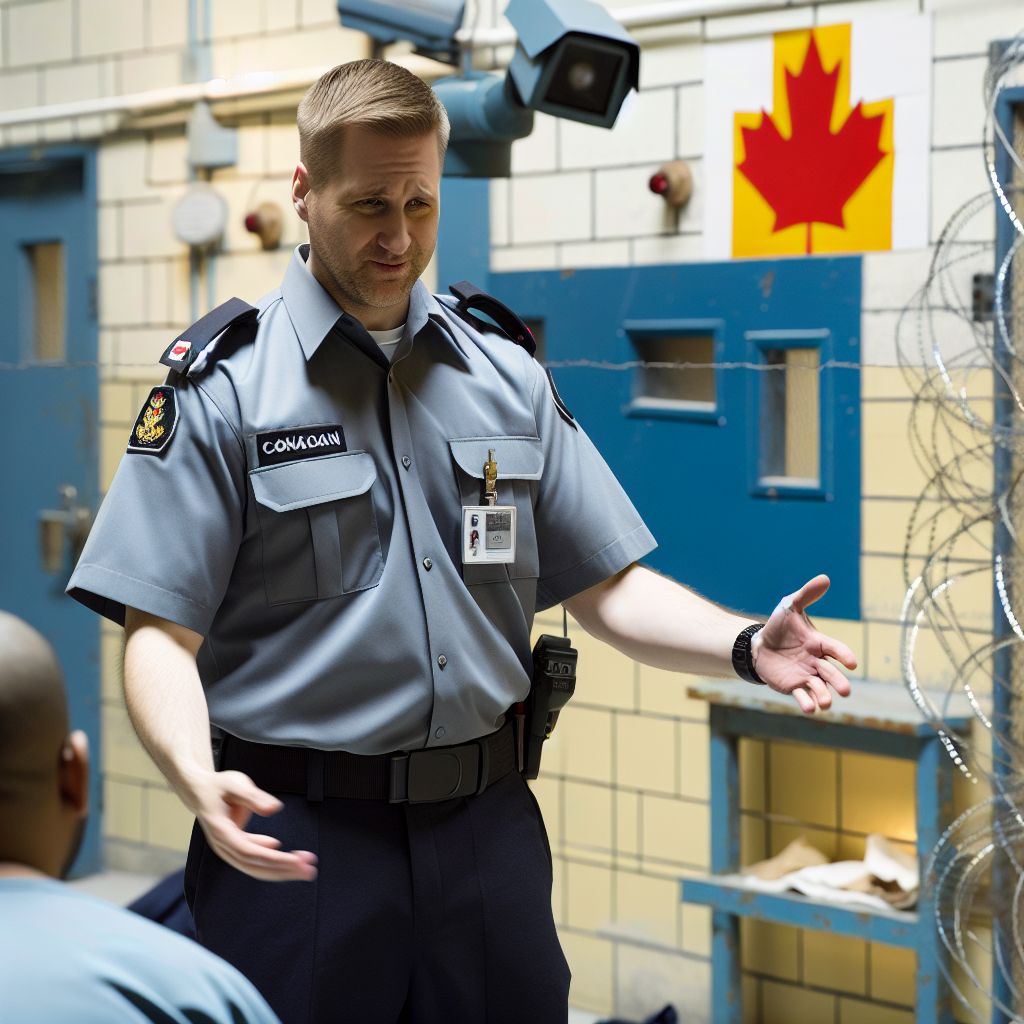Overview of the Role of Correctional Officers in Canadian Prisons
Correctional officers play a vital role in maintaining safety in Canadian prisons.
They ensure the security and order of correctional facilities.
Moreover, they are responsible for supervising inmates and enforcing rules.
Responsibilities of Correctional Officers
Every day, correctional officers monitor inmates’ behavior.
They conduct regular searches to prevent contraband from entering the facility.
Additionally, they prepare reports on incidents and inmate interactions.
Officers also play a crucial part in crisis intervention and conflict resolution.
Work Environment Challenges
Correctional officers face several challenges in their work environment.
High-stress levels are common due to unpredictable inmate behavior.
Moreover, they must be prepared for potential violence in the workplace.
Support systems, including mental health resources, are essential for their well-being.
Training and Qualifications
To become a correctional officer, candidates must undergo specific training.
This training includes physical fitness, communication skills, and self-defense techniques.
Furthermore, officers receive training in conflict de-escalation strategies.
Continual education is vital for adapting to changes within the correctional system.
Impact on Inmate Rehabilitation
Correctional officers significantly influence inmate rehabilitation efforts.
They facilitate programs that aim at behavioral change and skill development.
Building rapport with inmates can lead to more effective rehabilitation outcomes.
Ultimately, officers contribute to reducing recidivism rates through support and guidance.
Physical Environment: Facilities and Safety Measures in Prisons
Overview of Prison Facilities
Canadian prisons are designed to accommodate various security levels.
Facilities range from maximum security to minimum security settings.
Each facility has specific architectural features to enhance security.
For instance, maximum security prisons use robust barriers and surveillance systems.
Conversely, minimum security institutions focus on rehabilitation.
Work Areas for Correctional Officers
Correctional officers work in various designated areas within prisons.
Unlock Your Career Potential
Visualize a clear path to success with our tailored Career Consulting service. Personalized insights in just 1-3 days.
Get StartedThese areas include control rooms, visitation areas, and inmate housing units.
Control rooms serve as central command for monitoring inmate activity.
Visitation areas are designed to maintain safety during family visits.
Inmate housing units require constant supervision to ensure order.
Safety Measures Implemented
Safety is a priority in all Canadian prisons.
Correctional officers undergo thorough training in conflict resolution.
They learn to manage difficult situations and maintain order.
Each facility is equipped with emergency response systems.
These systems help ensure prompt action during crisis situations.
Daily Security Protocols
Daily routines in prisons involve strict security protocols.
Officers perform regular checks on inmate behavior and activities.
Additionally, they conduct searches for contraband items.
Regular training keeps officers prepared for potential security breaches.
Collaboration among staff members reinforces a secure environment.
Mental and Physical Well-Being
The physical environment impacts the well-being of correctional officers.
Access to adequate facilities and resources is crucial for morale.
Common areas provide spaces for rest and debriefing during shifts.
Support programs also aid in managing the mental stress of the job.
Peer support initiatives encourage positive interactions among staff.
Psychological Environment: Challenges and Stress Factors Faced by Officers
Emotional Toll of Duty
Correctional officers face immense emotional challenges daily.
They frequently encounter high-stress situations in their work environment.
Moreover, regular exposure to conflict can lead to emotional fatigue.
In addition, witnessing violent incidents can have lasting impacts.
Officers often struggle to manage their feelings effectively.
Impact of Workload and Shift Patterns
The workload for correctional officers is often demanding and unpredictable.
Long hours and rotating shift patterns contribute to fatigue and stress.
Consequently, officers may experience difficulties in work-life balance.
Additionally, extended hours can erode physical and mental health.
This constant pressure affects their overall job satisfaction.
Relationship with Inmates
Building relationships with inmates is a complex aspect of their role.
Trust can sometimes be established, but it can also lead to vulnerability.
Officers need to navigate potential manipulation from inmates.
This dynamic creates an underlying tension in their daily interactions.
Consequently, maintaining professional boundaries is crucial yet challenging.
Inadequate Support Systems
Many officers report a lack of adequate support from their organizations.
This absence of support can lead to feelings of isolation.
Furthermore, resources for mental health care are often insufficient.
Officers may hesitate to seek help due to stigma or fear of reprisal.
Consequently, they may suffer in silence, unable to cope with stressors.
Training and Preparedness
Inadequate training on mental health issues can exacerbate stressors.
Officers may feel unprepared to handle psychological challenges.
Moreover, training often focuses on physical confrontations over mental resilience.
This imbalance can limit their ability to cope effectively in the field.
As a result, many officers may develop negative coping mechanisms.
Find Out More: Canadian Industries Hiring Environmental Officers Today
Training and Development: Required Skills and Ongoing Education for Correctional Officers
Essential Skills for Correctional Officers
Correctional officers require a diverse set of skills to perform their duties effectively.
Communication skills play a key role in maintaining safety and order.
Officers must understand how to de-escalate conflicts peacefully.
Leadership abilities are fundamental in guiding inmates and managing teams.
Personnel management skills help in supervising staff and responding to emergencies.
Moreover, problem-solving expertise is vital for addressing daily challenges.
Training Programs for New Recruits
New recruits undergo comprehensive training programs before assuming their roles.
These programs cover various topics related to prison policies and procedures.
Officers learn about emergency response protocols during these sessions.
Furthermore, mental health awareness is an integral part of the curriculum.
Physical fitness training ensures that officers can handle demanding situations.
New hires also receive instruction on cultural competency to enhance communication.
Continual Professional Development
Ongoing education is crucial for correctional officers throughout their careers.
They must stay updated on legal reforms and new laws affecting corrections.
Workshops and seminars provide valuable insights into current issues within the system.
Networking with professionals can foster knowledge sharing and community support.
Mentorship programs offer guidance for career advancement opportunities.
Additionally, specialized training addresses emerging trends and technologies.
Certification and Advanced Training Opportunities
Many correctional officers pursue certification for enhanced credibility.
These certifications often focus on areas like crisis intervention or conflict resolution.
Advanced training programs prepare officers for leadership and supervisory roles.
The certification process includes continuous assessment and skill enhancement.
Ultimately, these initiatives ensure a professional workforce equipped to manage challenges.
Role of Mental Health Education
Mental health training equips officers to understand and assist inmates effectively.
This education fosters empathy and reduces stigmatization of mental health issues.
Furthermore, trained officers can better manage situations involving mental health crises.
Collaboration with mental health professionals enhances support for inmates.
Such initiatives also contribute to a safer work environment.
Uncover the Details: Communication Skills for Correctional Officers in Canada
Work Schedules and Shift Patterns
Overview of Correctional Officer Shifts
Correctional officers typically work in rotating shifts.
This includes nights, weekends, and holidays.
Such schedules can disrupt personal lives and routines.
Impact on Health and Well-being
Irregular work hours can lead to sleep disturbances.
Officers often experience higher stress levels.
They may suffer from fatigue due to constant shift changes.
Work-Life Balance Challenges
Balancing work and personal life is challenging for correctional officers.
Shift patterns affect family time and social activities.
Many officers find it hard to maintain relationships.
Strategies for Improvement
Some institutions offer flexible scheduling options.
These options can help officers manage their time better.
Support groups and counseling can also alleviate stress.
Shift Impact on Officers’ Lives
Shift patterns significantly affect correctional officers’ lives.
Finding a balance between work and personal life is essential.
Improvements can lead to healthier, more productive officers.
Uncover the Details: Impact of Border Services Officers on Canadian Economy

Professional Relationships: Interaction with Inmates and Other Staff
Communication Skills
Correctional officers rely heavily on effective communication.
They must clearly convey rules to inmates.
Moreover, they need to listen actively to inmate concerns.
Effective communication fosters cooperation within facilities.
Building Trust
Trust is essential in a correctional setting.
Officers can build trust through consistency and fairness.
Inmates are more likely to engage positively when trust is established.
Additionally, trust improves overall safety within the institution.
Teamwork Among Staff
Collaboration among staff is crucial for operational success.
Correctional officers work closely with various professionals.
These include social workers, psychologists, and administrative staff.
Effective teamwork enhances the decision-making process.
Understanding Inmate Dynamics
Inmates have complex social interactions within the prison.
Officers must understand these dynamics to manage conflicts.
Proactively addressing issues can prevent escalation.
Furthermore, understanding inmate backgrounds aids in rehabilitation efforts.
Dealing with Challenges
Correctional officers face unique challenges daily.
They deal with high-stress situations frequently.
Moreover, managing difficult behaviors is part of their role.
Training programs help officers develop coping strategies.
Support Systems
Support from colleagues is vital for correctional officers.
Peer support can help mitigate stress levels.
Facilities often provide resources for mental health support.
Utilizing these resources contributes to overall well-being.
Explore Further: Canadian Provinces with High Demand for Environmental Officers
Crisis Management
Protocols for Emergency Situations
Correctional facilities face various emergencies regularly.
Effective protocols are vital for addressing these situations.
Each facility develops its own guidelines based on specific risks.
These guidelines aim to maintain safety for both staff and inmates.
Staff undergo regular training to stay updated on procedures.
This training includes simulations of potential crisis scenarios.
They learn to respond swiftly to prevent escalation.
Types of Emergencies
Multiple types of emergencies can occur in prisons.
These include riots, medical emergencies, and escapes.
Each type requires a tailored response plan.
For riots, a lockdown procedure activates to secure the facility.
During a medical emergency, staff must contact medical professionals immediately.
Communication During Crises
Clear communication is essential in any crisis situation.
Staff members use radios to relay information quickly.
This ensures everyone receives timely updates on the situation.
Moreover, established chains of command enhance response efficiency.
Post-Crisis Evaluation
After any crisis, a thorough evaluation occurs.
This process reviews what happened and how well protocols worked.
Feedback from staff shapes future training sessions.
Additionally, this evaluation identifies areas for improvement.
Adjustments to protocols can enhance future responses.
Support Systems for Staff
Supporting correctional officers post-crisis is crucial.
Stress management programs help staff cope with traumatic events.
Counseling services offer mental health support as needed.
Such services promote overall wellbeing among officers.
Health and Wellness Programs: Support Systems for Correctional Officers
Overview of Health and Wellness Programs
Health and wellness programs are crucial for correctional officers.
These programs aim to enhance physical and mental well-being.
They address the unique challenges faced in the prison environment.
Physical Fitness Initiatives
Physical fitness initiatives promote active lifestyles among officers.
Regular exercise reduces stress levels effectively.
Programs often include gym access and fitness classes.
Furthermore, these initiatives encourage healthy diet choices.
Mental Health Resources
Mental health resources provide essential support to correctional officers.
Access to counseling services ensures they can cope with workplace stress.
Additionally, peer support groups create a sense of community.
These resources help reduce anxiety and depression rates.
Training and Workshops
Training and workshops enhance coping mechanisms for officers.
These programs cover topics such as stress management and resilience.
Interactive sessions promote sharing of experiences and strategies.
Moreover, they strengthen bonds among team members.
Work-Life Balance Strategies
Work-life balance strategies promote healthier lifestyles for officers.
Employers encourage flexibility in work schedules.
They also offer time for personal growth and family commitments.
Such initiatives reduce burnout rates effectively.
Continuous Feedback and Improvement
Continuous feedback is vital for program effectiveness.
Regular surveys help identify officer needs and preferences.
This data guides the modification of existing programs.
Ultimately, focusing on officer well-being enhances workplace morale.




